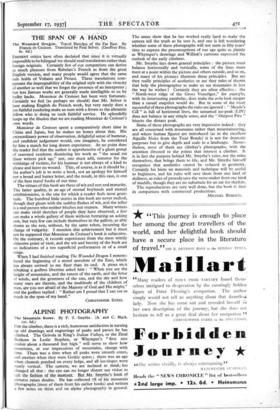THE SPAN OF A HAND
EMINENT critics have often declared that since it is virtually impossible to be bilingual we should read translations rather than foreign originals. Certainly few of our compatriots can derive as much pleasure from Rabelais's French as from the great English version, and many people would agree that the same rule holds of Voltaire and Proust. These translations com- pensate the impregnability of the original style with the vivacity of another so well that we forget the presence of an interpreter ; but less famous works are generally made intelligible to us by bulky hacks. Monsieur de Croisset has been very fortunate. Certainly we feel (as perhaps we should) that Mr. Selver is here making English do French work, but very rarely does a too faithful rendering make us turn with a frown to the altruistic fellow who is doing us such faithful service. He splendidly keeps up the illusion that we are reading Monsieur de Croisset's own words.
Monsieur de Croisset spent a comparatively short time in China and Japan, but he makes no bones about that. His extraordinary power of observation, delightful sense of humour, and confident judgement would, one imagines, be considered by him a match for long drawn experience. At no point does the reader feel that the author is apprehensive of a glum group of seasoned residents dismissing his work as " the usual rot these writers pick up," nor, one must add, remorse for the writhings of victims, for his humour is not always of a kind to please and leave no wound. This, of course, is as it should be ; the author's job is to write a book, not an apology for himself nor a bread and butter letter, and the result, in this case, is one of the best travel books of our time.
The virtues of this book are those of wit and zest and maturity. The latter quality, in an age of eternal boyhoods and eternal exhibitionisms, is the one for which a reader feels most grati- tude. The hundred little stories in this book are never rushed, though they gleam with the sudden flashes of wit, and the teller is a real person who neither blushes nor stutters. Many writers can make vivid sketches of people they have observed, a few can make a whole gallery of them without betraying an aching arm, but very few can include themselves in the gallery, as ably drawn as the rest, without, by the same token, incurring the charge of vulgarity. I mention this achievement but it must not be supposed that Monsieur de Croisset's book is subjective. On the contrary, it records experiences from the most wittily objective point of view, and the wit and brevity of the book are no indications of a too superficial performance or of a small range.
When I had finished reading The Wounded Dragon I remem- bered the beginning of a moral anecdote of the East, which has always seemed to me finer than its end. A pious mm rebuking a godless libertine asked him : " When you see the height of mountains, and the extent of the earth, and the force of winds, and the greatness of the sun, and the sky and how many stars are therein, and the multitude of the children of men, are you not afraid of the Majesty of God and His might," and the godless replied : " Rather am I proud that I can see so much in the span of my hand."
CHRISTOPHER SYKES.










































 Previous page
Previous page